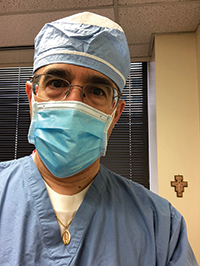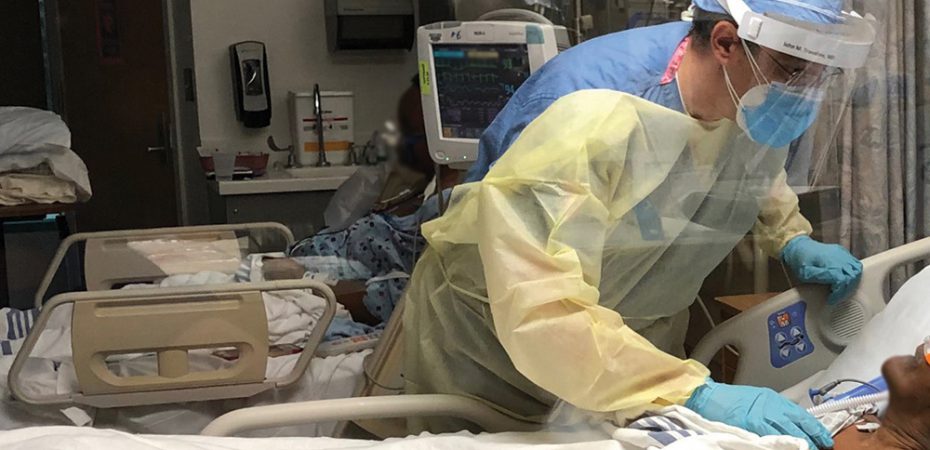Not a Typical Good Friday
Deacon John Travaline 1
Good Friday this year, to say the least, was very unusual and anything but typical. And we all know why. It occurred in the midst of the coronavirus (COVID-19) pandemic and at a time early in the pandemic when everyone was still adapting to the crisis. It was a period characterized by heightened fears and uncertainty, a time when we were barraged with information, recommendations and forecasts seemingly from any and everyone.
By this time in the pandemic, public gatherings of people in churches and other places of worship were prohibited, and it was quite sad for many of us not to experience the Triduum as we were accustomed. There was nothing typical during these times. Everything we were doing — in our homes, with our families, at work (if we were allowed to work) — was unprecedented in so many ways.
As deacons during the pandemic, the expression of our diaconal call and response undoubtedly was atypical as well. One expression of typical diaconal service is to visit patients in a hospital and pray with them at the bedside, providing spiritual comfort and support. But visits to hospitals and nursing homes were prohibited. Now we had to rethink how to respond under these new circumstances.
Physician’s Role
At work, for me as a physician, things were also strikingly different. Before the pandemic, conducting rounds on patients with the medical team would involve visiting patients in their rooms, spending time with them throughout the day, working to get them better. Now, during this pandemic, we only entered rooms when it was absolutely necessary and consciously were aware of limiting contact with patients.
As an attending physician, I was directing patient care, many times through nurses and respiratory therapists, without having to be close to patients at the bedside. Interacting with patients meant seeing and talking with them through plastic windows inset in makeshift, zippered plastic doors enclosing makeshift hospital rooms in otherwise nonclinical areas of the hospital and outpatient offices.
For patients, this mode of encounter further amplified the isolation and loneliness already caused by the disease, and for healthcare workers impeded the usual way of providing care.
Human Suffering
Yes, this Good Friday was unusual. On this day as Christians we call to mind the consummation of our Father’s love for humanity by the redemptive suffering and death of Jesus on the cross at Calvary; this day, in 2020, evidenced human suffering in droves, more so than at other times due to the magnitude wrought by this global pandemic. As a deacon and physician, my experience on this particular day was surreal.
As my colleagues and I were donning our PPE (personal protective equipment) gear to keep us safe, before we embarked across the enclosed connector bridge between the hospital buildings, about to enter the COVID units, we were anxiously making silly jokes about the situation we were about to face, undoubtedly a psychological defensive mechanism to assuage our own fears and concerns for what we were called to do as physicians. In step with this banter, holding up the Miraculous Medal I wear around my neck, I asserted to the group that this was the most important of all of my PPE. A flurry of affirmative comments and acknowledgments ensued, and we set out to encounter our patients.
Patient Encounters

As I rounded patient wards that morning, I encountered individuals with various degrees of illness. There were some who sat alone on cots in their cells, appearing to be relatively less afflicted by the virus. They were among others, though, who were more severely affected, many requiring heavy sedation and life-support therapies, including mechanical ventilation. In the former group, though, if they did not explicitly express their fear and sadness, it was apparent by their faces.
Their concerns, too, varied. As I encountered one patient, the first thing he asked was: “Doc, who’s paying for this? No one asked for my insurance cards, and I have insurance, you know.”
I replied, “Don’t worry about that, we’ll take care of it.”
The next patient asked, “Can you call my wife and tell her I have COVID, but don’t scare her.”
My reply, “We will call her, and don’t worry.”
By noon on this unusually eerie Good Friday, I recalled how as a deacon I would have been leading the Office of Readings for our parish, and then preparing for the Passion of Our Lord service that afternoon. This Holy Week, though, these liturgies were not to be conducted in public gatherings.
Call of the Deacon
Recounting this year’s Good Friday calls to mind how we may experience diaconal service when things are not as we are accustomed to them being. And there is an important lesson here. Lest we become complacent in day-to-day, week-to-week, year-to-year routines, liturgical or not, the pandemic has prompted us to rethink, renew and reaffirm questions like the ones I frequently ask myself and discuss with my spiritual director: “What does it mean to be a deacon, and how is this manifested to others, especially outside of liturgy?”
This Good Friday, when I otherwise would have been routinely serving at the altar and praying publicly with parishioners, this question was not merely posed, but demanded a response, right then and there. Amid an unprecedented global crisis there was an urgent need, in some ways more than ever, to be diaconal. I’m not sure I responded obediently or even gave a response; God will judge. But the call was unmistakably present.
Many of us have been deeply affected by the pandemic. Our routines have been and continue to be disrupted. We have been called, drawn or forced out of our comfort zones, perhaps more now than at any other time. In the spiritual dimension of our life, distractions have perhaps intruded more into personal prayer and desolation may be more prevalent. But through all of this, our diaconal call remains unperturbed. Though we may affirm that God’s call has never changed, our capacity to hear and respond may waver, particularly when we settled into routines that no longer exist.
DEACON JOHN TRAVALINE, M.D., is a professor of thoracic medicine and surgery at the Lewis Katz School of Medicine at Temple University and a deacon of the Archdiocese of Philadelphia.
………………………………………………………………………………………………………………………………………
Guiding Principles
Recalling our commissioning by the Divine Physician, the Catholic Christian physician has a special calling — different from the secular world — in that he or she sees the human person as an invaluable creation of God whose individual worth should never be sacrificed — even in the midst of a pandemic. Because of this immutable truth, Catholic physicians have an obligation to lead in times of crisis and to ensure both the upholding of human dignity and the safeguarding of the public health.”
— “Guiding Principles for Catholic Healthcare Professionals during a Pandemic,” Catholic Medical Association website, cathmed.org
………………………………………………………………………………………………………………………………………..






Comments are closed.